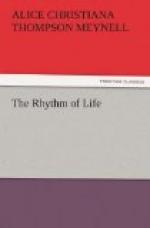INNOCENCE AND EXPERIENCE
I shall not ask the commentators whether Blake used these two words in union or in antithesis. They assuredly have an inseverable union in the art of literature. The songs of Innocence and Experience are for each poet the songs of his own separate heart and life; but to take the cumulative experiences of other men, and to use these in place of the virginal fruit of thought—whereas one would hardly consent to take them for ordering even the most habitual of daily affairs—is to forego Innocence and Experience at once and together. Obviously, Experience can be nothing except personal and separate; and Innocence of a singularly solitary quality is his who does not dip his hands into other men’s histories, and does not give to his own word the common sanction of other men’s summaries and conclusions. Therefore I bind Innocence and Experience in one, and take them as a sign of the necessary and noble isolation of man from man—of his uniqueness. But if I had a mind to forego that manner of personal separateness, and to use the things of others, I think I would rather appropriate their future than their past. Let me put on their hopes, and the colours of their confidence, if I must borrow. Not that I would burden my prophetic soul with unjustified ambitions; but even this would be more tolerable than to load my memory with an unjustifiable history.
And yet how differently do the writers of a certain kind of love-poetry consider this matter. These are the love-poets who have no reluctance in adopting the past of a multitude of people to whom they have not even been introduced. Their verse is full of ready-made memories, various, numerous, and cruel. No single life—supposing it to be a liberal life concerned with something besides sex—could quite suffice for so much experience, so much disillusion, so much deception. To achieve that tone in its fulness it is necessary to take for one’s own the praeterita (say) of Alfred de Musset and of the men who helped him—not to live but—to have lived; it is necessary to have lived much more than any man lives, and to make a common hoard of erotic remembrances with all kinds of poets.
As the Franciscans wear each other’s old habits, and one Friar goes about darned because of another’s rending, so the poet of a certain order grows cynical for the sake of many poets’ old loves. Not otherwise will the resultant verse succeed in implying so much—or rather so many, in the feminine plural. The man of very sensitive individuality might hesitate at the adoption. The Franciscan is understood to have a fastidiousness and to overcome it. But these poets so triumph over their repugnance that it does not appear. And yet, if choice were, one might wish rather to make use of one’s fellowmen’s old shoes than put their old secrets to use, and dress one’s art in a motley of past passions.




